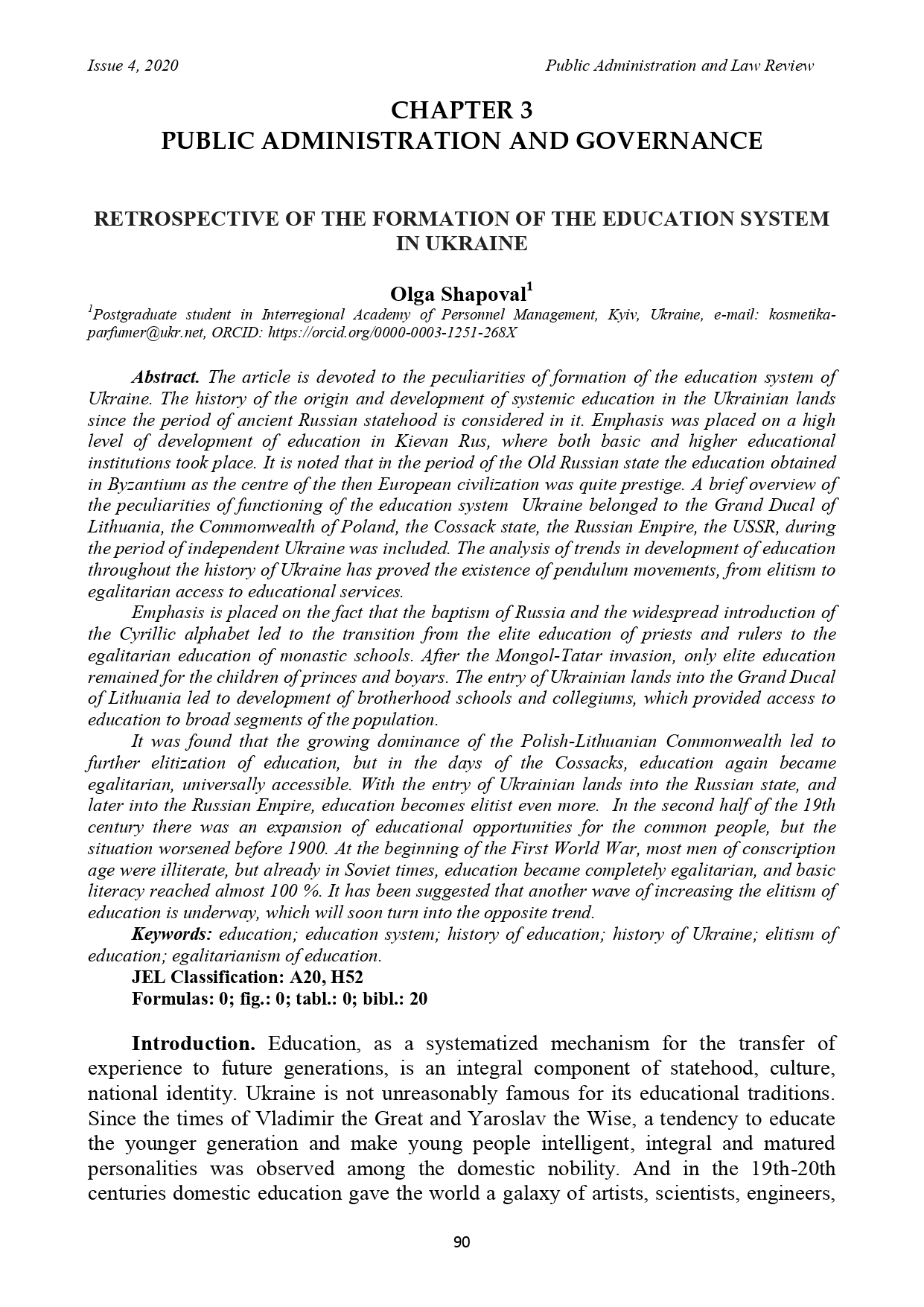RETROSPECTIVE OF THE FORMATION OF THE EDUCATION SYSTEM IN UKRAINE
DOI:
https://doi.org/10.36690/10.36690/2674-5216-2020-4-90Keywords:
education, education system, history of education, history of Ukraine, elitism of education, egalitarianism of educationAbstract
The article is devoted to the peculiarities of formation of the education system of Ukraine. The history of the origin and development of systemic education in the Ukrainian lands since the period of ancient Russian statehood is considered in it. Emphasis was placed on a high level of development of education in Kievan Rus, where both basic and higher educational institutions took place. It is noted that in the period of the Old Russian state the education obtained in Byzantium as the centre of the then European civilization was quite prestige. A brief overview of the peculiarities of functioning of the education system Ukraine belonged to the Grand Ducal of Lithuania, the Commonwealth of Poland, the Cossack state, the Russian Empire, the USSR, during the period of independent Ukraine was included. The analysis of trends in development of education throughout the history of Ukraine has proved the existence of pendulum movements, from elitism to egalitarian access to educational services.
Emphasis is placed on the fact that the baptism of Russia and the widespread introduction of the Cyrillic alphabet led to the transition from the elite education of priests and rulers to the egalitarian education of monastic schools. After the Mongol-Tatar invasion, only elite education remained for the children of princes and boyars. The entry of Ukrainian lands into the Grand Ducal of Lithuania led to development of brotherhood schools and collegiums, which provided access to education to broad segments of the population.
It was found that the growing dominance of the Polish-Lithuanian Commonwealth led to further elitization of education, but in the days of the Cossacks, education again became egalitarian, universally accessible. With the entry of Ukrainian lands into the Russian state, and later into the Russian Empire, education becomes elitist even more. In the second half of the 19th century there was an expansion of educational opportunities for the common people, but the situation worsened before 1900. At the beginning of the First World War, most men of conscription age were illiterate, but already in Soviet times, education became completely egalitarian, and basic literacy reached almost 100 %. It has been suggested that another wave of increasing the elitism of education is underway, which will soon turn into the opposite trend.
Downloads
References
Cherevychna, N. I. and Skyrda, O. Ye. (2016), “Review of the stages of formation of higher education in the times of Kievan Rus and the Cossacks”, Molodyi vchenyi, № 6, pp. 484-489.
Naumenko, F. I. (1965), Shkola Kyivskoi Rusi [School of Kievan Rus], Lviv, Ukraine, 123 p.
Halytska, M. M. (2014), “Cultural principles of education development in Kievan Rus”, Neperervna profesiina osvita: teoriia i praktyka, №3-4, рр. 117-122.
Krypiakevych, I. P. (1990), Istoriia Ukrainy [History of Ukraine], Svit, Lviv, Ukraine, 520 p.
Sheiko, V. M. and Bilotserkivskyi, V. Ya. (2009), Istoriia ukrainskoi kultury [History of Ukrainian Culture], Kyiv, Ukraine, 413 p.
Patona, B. Ye. (2001), Istoriia ukrainskoi kultury [History of Ukrainian Culture], Naukova dumka, Kyiv, Ukraine, 1134 p.
Medvid, L. A. (2003), Istoriia natsionalnoi osvity i pedahohichnoi dumky v Ukraini [History of national education and pedagogical thought in Ukraine], Vikar, Kyiv, Ukraine, 335 p.
Dziuba, O. (2003), “Fraternal schools”, Entsyklopediia istorii Ukrainy, 688 p.
Kozlovskiy, I. (1869), “The fate of the Russian language in Lithuania and Zhmudi”, Vestn. Zap. Rossii, 85-111 p.
Kurliak, I. Ye. (1996), “Historical and pedagogical aspects of the formation of the first Ukrainian lyceums”, Pytannia pedahohiky serednoi i vyshchoi shkoly, pp. 20-23.
Velemets, O. V. (1998), “Development of education and pedagogical thought in the Western Ukrainian lands in the XVI-XVIII centuries”, Ph.D. Thesis, Technical, 22 p.
Kovalskyi, M. P. (1998), “Ostroh old prints”, Ukrainskyi almanakh, pp. 100-106.
Petro Mohyla i Kyievo-Mohylianska kolehiia [Petro Mohyla and Kyiv-Mohyla Collegium], Kazka, Kyiv, Ukraine, pp. 170-172.
Akymovych, Ye. O. (2009), Petro Mohyla – reformator. Ukrainska kultura v istorychnomu vymiri [Petro Mogila is a reformer. Ukrainian culture in the historical dimension], Maiak, Odessa, Ukraine, p. 127-131.
Hluzman, O. V. (2011), “Historical preconditions for the formation of university pedagogical education in the global and national context”, Naukovi pratsi. Ser. : Pedahohika, №141, рр. 12-15.
Mylko, V. I. (2017), “Gymnasiums of Ukrainian cities in the period of modernization of the Russian Empire (late XIX - early XX centuries.)”, Problemy istorii Ukrainy ХІХ — poch. ХХ, vol. 26, pp. 195-209.
The official site of osvita.ua (2021), retrieved from : http://osvita.ua/news/43501/.
The official site of Nova ukrainska shkola (2021), “Piat mifiv pro optymizatsiiu shkilnoi merezhi i shcho z nymy robyty”, retrieved from : https://nus.org.ua/articles/p-yat-mifiv-pro-optymizatsiyu-shkilnoyi-merezhi-i-shho-z-nymy-robyty/
Akimkin, O. (2020). DEVELOPMENT OF PRIVATE EDUCATION IN UKRAINE: SECOND HALF OF XIX-EARLY XX CENTURY. Pedagogy and Education Management Review, (1), 4-12. https://doi.org/10.36690/2733-2039-2020-1-4
Zavitrenko, D., Berezenko, N., & Zavitrenko, A. (2020). REFORMING OF THE PRIMARY EDUCATION SYSTEM IN UKRAINE (1917-1939). Pedagogy and Education Management Review, (2), 10-16. https://doi.org/10.36690/2733-2039-2020-2-10

Downloads
Published
How to Cite
Issue
Section
License
Copyright (c) 2021 “Scientific Center of Innovative Researches” OÜ

This work is licensed under a Creative Commons Attribution 4.0 International License.





